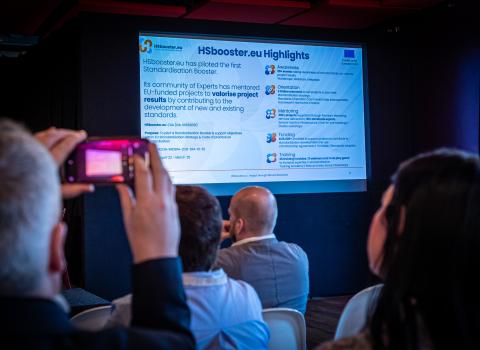Members of the European Parliament this week called for the comprehensive co-ordination of the policies of the EU and the Member States to boost competitiveness and business opportunities for SMEs, and foster an entrepreneurial culture.
On Tuesday the Committee on Industry, Research and Energy (ITRE) adopted by a large majority, a report on an ‘Internationalisation Strategy for European Small and Medium-Sized Enterprises (SMEs)’.
“We must remove the chains from SMEs in the European Union,” said Paul Rübig, the EPP Group MEP who acted as rapporteur on the report which is seeking a “comprehensive co-ordination” of the policies of the EU and the Member States to boost competitiveness and business opportunities for SMEs. “The fact that only 25 percent of European SMEs are active in the EU's internal market proves that action is needed,” Rübig said.
Yet it is clear that SMEs provide the engine for innovation and economic recovery: between 2002 and 2010 85 percent of all new jobs in the EU were created by SMEs, and in particular by new companies.
The key to an economic rebound
While national industry policies vary greatly across the EU, outside the EU complicated customs regulations, unclear technical prescriptions and a lack of market information make entrepreneurs think very hard before they embark on doing business abroad.
“Especially now, in these economically difficult times, the EU cannot afford such obstacles,” Rübig stressed. “Sustainable growth does not come from a couple of large, prestigious projects, but from the rank and file of SMEs. That is why the key to an economic rebound is in strengthening the competitiveness and capacity of SMEs to innovate,” he said.
Amongst other measures, the Rübig Report calls for a reduction in costs for founding new enterprises via One Stop Shops, pilot projects to test out innovative tax regimes for SMEs and more education in entrepreneurial thinking in schools.
Rübig also wants to expand programmes like Erasmus to young entrepreneurs, giving talented entrepreneurs the chance to acquire experience abroad.
Better national implementation
Over and above any policy measures to support SMEs, there needs to be a better system for implementing measures by Member States. “If EU business laws are transposed by the Member States with ever new divergences and additional provisions, then the [opposite] of what was planned will be achieved [and there will be] additional hassle and administrative burdens for SMEs,” said Rübig.
A recent study found that almost one third of the administrative burden deriving from EU legislation stems from inefficient national implementation, which means that up to €40 billion could be saved if Member States transposed EU legislation more efficiently.
In a bid to overcome this, the report suggests setting out new policy measures as Regulations, rather than as EU laws, since Regulations are directly enforceable in the EU member countries and do not need transposing into national law.
Boost for SMEs
The ALDE Group of Liberal and Democrat MEPs also welcomed ITRE’s adoption of the Rübig Report, noting that ALDE played a key role, securing the addition of a number of demands to the report, in line with the group’s "Boost for SMEs" campaign, launched earlier this year. In total ALDE MEPs co-signed 57 amendments in line with the SME campaign manifesto.
These include a 'fitness check' amendment, which aims to remove obsolete and ineffective EU laws that affect SMEs; amendments to improve access to information on funding that is available through structural and cohesion funds, and moves to improve rural broadband to enable working from home. Like the EPP, ALDE wants to remove the additional red tape that is generated when EU employment law is implemented at a national level.
The ALDE Shadow Rapporteur Kent Johansson (Centerpartiet, Sweden) said, “The adoption of this report is a step in the right direction, both for SMEs in Europe and for ALDE’s SME campaign. Small businesses hold the key to providing the growth we need to restore Europe's global competitiveness.”
Jürgen Creutzmann (Germany, FDP), who is Parliament’s Rapporteur for COSME, the Commission’s new Programme for the Competitiveness of Enterprises and Small and Medium-sized Enterprises, which will run from 2014 to 2020 with a planned budget of €2.5billion, said, “We need a new target for the reduction of administrative burdens on SMEs and vitally, better access to finance. I am delighted [ITRE] also called today for an increase in the budget for the forthcoming COSME Programme, which is the key SME-specific instrument we will have for the future."
More transparency and less bureaucracy for SMEs
In another measure intended to provide a boost for SMEs, the Legal Affairs Committee of the European Parliament adopted two reports updating EU legislation on transparency and accounting. The new rules ease requirements for SMEs.
Alexandra Thein (FDP, Germany), who was the ALDE rapporteur for the reports said, “The preparation of financial statements is one of the most burdensome regulatory obligations for companies. Small companies in particular face proportionally higher administrative burdens.” In future SMEs will be “massively relieved” with regard to their accounting, Thein said.





 A unique international forum for public research organisations and companies to connect their external engagement with strategic interests around their R&D system.
A unique international forum for public research organisations and companies to connect their external engagement with strategic interests around their R&D system.